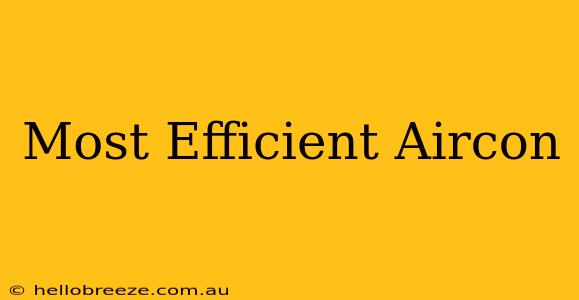Choosing the right air conditioner can significantly impact your energy bills and comfort levels. This guide explores the key factors to consider when searching for the most efficient air conditioner, helping you make an informed decision and save money in the long run.
Understanding Air Conditioner Efficiency
The efficiency of an air conditioner is measured using the SEER rating (Seasonal Energy Efficiency Ratio). The higher the SEER rating, the more efficient the unit. A higher SEER rating translates directly to lower energy consumption and lower electricity bills. Look for units with SEER ratings of 16 or higher; some high-efficiency models boast ratings above 20.
Other Efficiency Factors to Consider:
- EER (Energy Efficiency Ratio): This measures the cooling output relative to the energy input, but SEER is a better indicator of overall seasonal efficiency.
- Energy Star Certification: Look for the Energy Star label. This indicates that the air conditioner meets stringent energy-efficiency guidelines set by the government.
- Inverter Technology: Inverter air conditioners adjust their cooling power based on the room's temperature, rather than cycling on and off. This leads to more consistent cooling and better energy efficiency.
Types of Efficient Air Conditioners
Several types of air conditioners offer high levels of efficiency:
1. Ductless Mini-Splits:
These systems are excellent for targeted cooling in specific rooms or zones. Their high SEER ratings and precise temperature control make them highly efficient. They are also a great option for homes without existing ductwork.
2. Central Air Conditioners:
While traditional central AC units can be less efficient than some newer models, high-SEER central AC systems offer significant improvements in energy savings compared to older units. Regular maintenance is crucial for maintaining their efficiency.
3. Window Air Conditioners:
Modern window air conditioners are becoming increasingly efficient. Look for those with high SEER ratings and Energy Star certification to maximize energy savings in smaller spaces. Proper installation is vital for optimal performance.
Tips for Maximizing Air Conditioner Efficiency
Even the most efficient air conditioner won't perform optimally without proper care and usage. Here are some tips to maximize efficiency:
- Regular Maintenance: Schedule professional maintenance annually to ensure your unit is operating at peak efficiency. This includes cleaning filters, checking refrigerant levels, and inspecting electrical components.
- Proper Sizing: An air conditioner that's too small will work harder and less efficiently, while one that's too large will cycle on and off frequently, wasting energy. Consult with an HVAC professional to determine the correct size for your space.
- Seal Leaks: Air leaks in windows, doors, and walls can significantly impact your air conditioner's efficiency. Seal these leaks with caulk or weatherstripping.
- Use Window Coverings: Shades, blinds, or curtains can help reduce heat gain through windows, reducing the workload on your air conditioner.
- Programmable Thermostat: A programmable thermostat allows you to set different temperatures for different times of the day, optimizing energy use.
Choosing the Right Efficient Air Conditioner for Your Needs
Selecting the most efficient air conditioner depends on factors like your budget, home size, existing infrastructure, and climate. Consulting with a qualified HVAC professional can help you find the best fit for your individual needs, guaranteeing optimal cooling and energy savings. Don't hesitate to ask about rebates and incentives available in your area for energy-efficient appliances. Investing in an energy-efficient air conditioner is a wise decision that will pay dividends in both comfort and lower energy bills for years to come.

